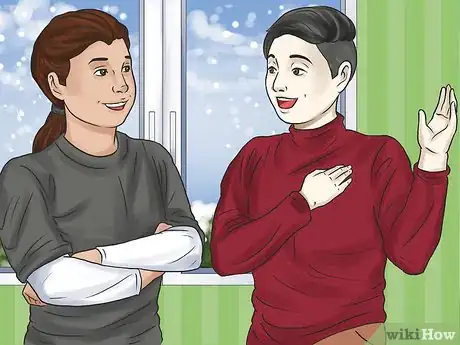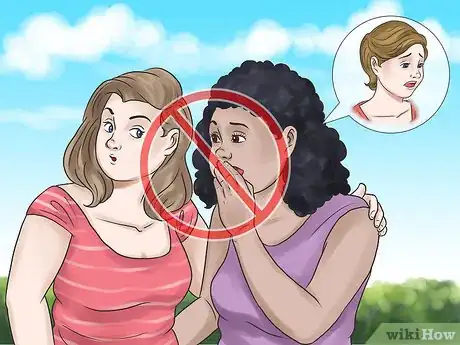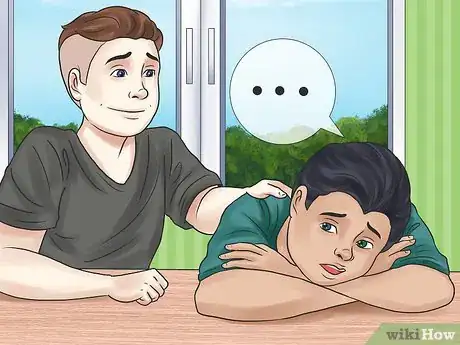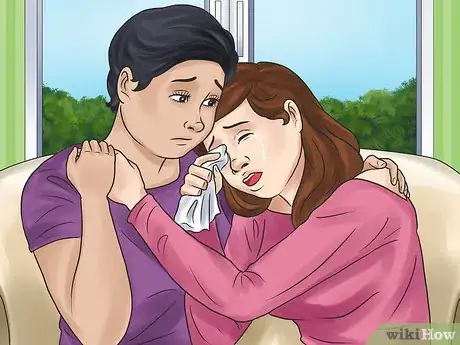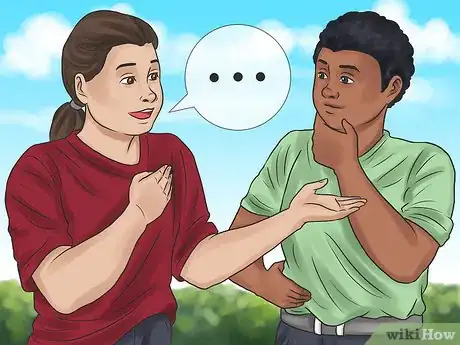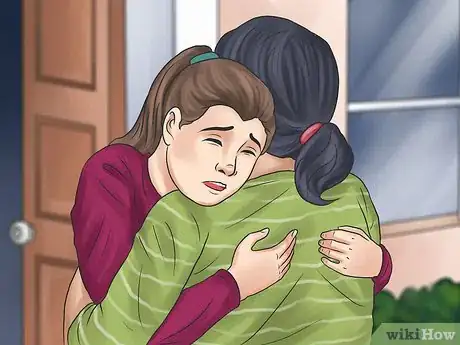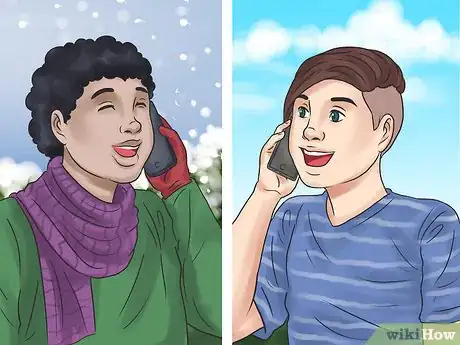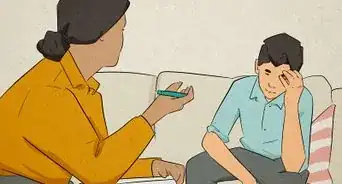This article was co-authored by Trudi Griffin, LPC, MS. Trudi Griffin is a Licensed Professional Counselor in Wisconsin specializing in Addictions and Mental Health. She provides therapy to people who struggle with addictions, mental health, and trauma in community health settings and private practice. She received her MS in Clinical Mental Health Counseling from Marquette University in 2011.
There are 8 references cited in this article, which can be found at the bottom of the page.
wikiHow marks an article as reader-approved once it receives enough positive feedback. This article has 30 testimonials from our readers, earning it our reader-approved status.
This article has been viewed 2,530,408 times.
Being a good friend isn't always easy, but taking the time to nurture a lasting friendship is worth every ounce of effort. Good friendships provide strength, happiness, and meaning in ways that social media or striving for popularity cannot. All true friendships are built on mutual trust and support, so whether you’re looking to make new, quality friendships or improve your existing ones, there are things you can do to be a good friend to others.
Steps
Becoming a Good Friend
Being Trustworthy
-
1Keep your promises. Don't ever make a promise that you can't keep–or at least don't make a habit of it. If you say you'll hang out with a friend and a legitimate conflict arises, explain the situation. If you just cannot go, give your friend a gift and tell them you're sorry. Nobody's perfect, and it's okay if you have to break a promise once in a blue moon, but don't make it a regular thing. If this is recurring over time, then you will probably be seen as untrustworthy. If you promised a friend something important, keep your promise and don't risk the loss of a friend.[1]
- When you make a serious promise, look at your friend in the eyes and speak slowly to show that you mean it instead of just saying it because you think that you should. Do not break any such promise, as that will hurt your friend. It might even break your friendship!
-
2Be dependable. Being dependable is one of the most important aspects of being a good friend. Your friend will need you for support, especially in hard times. Nobody wants to be friends with someone who actually isn't interested in them. It's hard to rely on a person who doesn't behave in a consistent and trustworthy way. We all know well-intentioned but flaky people who say, "Okay, I will..." but never follow through. If that's you, know that you're eroding your friends' trust; eventually, they'll stop believing what you say.[2]
- If you're not sure you can do something, don't agree to do it and flake out later. Instead, be honest about the fact that you're not sure if you can make it.
- Your friends should always feel like they can count on you, even when the going gets tough. If you're only there for the fun times, you'll be no more than a fair-weather friend.
Advertisement -
3Apologize when you've made a mistake. If you want your friends to trust you, then you can't act like you're flawless. If you know you've made a mistake, own up to it instead of being in denial. Though your friends won't be happy that you made a mistake, they'll be very pleased that you're mature and grounded enough to admit it instead of just pretending that nothing is wrong, or worse -- blaming it on someone else.[3]
- When you say sorry, you should mean it. Let your friends hear the sincerity in your voice instead of thinking that you don't care how they feel. You should also mean it, take the time to explain to your friend the misunderstanding or how you feel bad and want to fix your relationship.
-
4Allow yourself to be honest and vulnerable. If you want to be a good friend and to have people trust you, then you have to be honest about your feelings, about your friends' actions, and about how you feel about your friendship. If you're honest about how you feel and allow yourself to be vulnerable with your feelings, that will open up direct lines of communication with your friends and will make them more likely to open up to you. If your friend hurt you, don't be afraid to talk about it; if something is upsetting you, don't feel too shy to open up to your friend about it.[4]
- Being honest is different from being so blunt that you're hurting your friends. If you think your friend has a drinking problem, for example, then you owe it to your friend to start a conversation about it. But if you think your friend looks kind of weird in her new dress, you may want to keep your mouth shut.
- Be real. Connect with people whom you value on a deep level if you want to have sustainable, long-term friendships. Invest in people you can be yourself around. If your behavior lacks sincerity, your friendship won't last. Be honest about how you really feel even if you think your friend might disagree.
-
5Disagree with your friend in a respectful way. When a friend shares something that you find objectionable or simply so not agree with their opinion, it’s okay to say so! Let your friend know what you think and why. Just make sure that you are being respectful when you share your point of view.
- If you start to feel upset, take a moment to notice these feelings and any physical response you are having as well. It is normal to feel angry, but it will be much easier to respond in a respectful way if you calm yourself down first.
- Try to approach the situation with curiosity and a desire to learn more about your friend’s perspective.
- Speak your mind directly and be brave when you do so. It is not easy to oppose a friend, especially if they do or say something hateful or mean-spirited.[5]
-
6Don't use people. If one of your friends suspects that you're just using them, then they'll drop you like a hot potato. Good friendships don't arise from hoping someone else's popularity or networks will rub off on you. If you're trying to be friends with a person just to get into a certain clique, that's not friendship – it's opportunism – and eventually, the shallow nature of your involvement will reveal itself.
- And if you have a reputation of using people, then new people won't be too excited to start a friendship with you.
- A friendship is about giving and taking. Sure, it may be convenient that one of your friends gives you a ride to school every day, but make sure that you do something for that friend in return.
-
7Be loyal. If your friend tells you something in confidence, keep it and don't talk about it with anyone else, just as you'd expect your friend to do for you. Don't discuss your friend behind their back, and don't spread rumors about the confidences they've imparted to you. Never say anything about your friend that you would not be prepared to repeat to their face. Be loyal to your true friends and be prepared to defend them if your new friends, or people you barely know, start gossiping about them.[6]
- Part of being loyal is understanding the importance of a long-lasting and stable friendship. Don't throw all that away just to spend all your time hanging out with your new boyfriend or girlfriend or a cool new person you just met. Remember that your friends might feel left out.
- If you have a reputation for being a blabbermouth or a gossip, then your friends will quickly find out and they'll be hesitant to reveal anything personal to you in the future -- or even to spend much time with you at all.
- Don't let others say bad things about your friend, either. Until you've had a chance to hear your friend's side of the story, treat comments that are not supportive as hearsay and rumors. If someone says something that shocks you and doesn't seem like a thing your friend would do or say, then respond with something like, "I know them, and that doesn't sound right. Let me talk to them; find out their perspective on this. Until then, I would appreciate it if you didn't spread that around."
-
8Be respectful. Good friends show respect for each other by being openly and mutually supportive. If your friend has certain values and beliefs that don't align with your own, respect their choices and be open to hearing more about them. If you want your friend to trust you, then your friend should feel comfortable voicing opinions that you may not agree with, or discussing a new perspective with you. If your friend thinks that you'll shoot down any interesting or original idea that they may have, then your friendship won't be valued.
- Sometimes your friend will say things that you find boring, uncomfortable or annoying, but if you have respect for your friend, you'll give your friend the space to speak, and to do so without judgment.
- During times when you don't see eye to eye with your friend, disagree respectfully and be willing to see things differently.
Being Supportive
-
1Be selfless. Though you can't be selfless all the time, being selfless is an important part of being a good friend. Accommodate your friend's wishes whenever you can, provided this is done in a balanced way. Reciprocate his or her acts of kindness with caring deeds of your own, and your friendship will be strengthened. If you get a reputation for being selfish and only being around your friends when you need some help, then people will know you're not looking out for them.
- Do a favor for your friend just out of the goodness of your heart, not because you want something in return.
- There's a difference between being selfless at the right time and letting people walk all over you. If you feel like you're always helping your friends and get nothing back, then you may have a problem.
- Don't abuse generosity or wear out your welcome. When your friend does something nice for you, reciprocate quickly. Return any money you borrow promptly. Go home when it seems like the time is right.
-
2Be a good listener. Don't monopolize conversations, but rather take the time to truly understand and support your friend when they are talking to you. It sounds simple, but make sure you're listening as much as you're talking about yourself. If you're monopolizing every conversation with your feelings, your friend isn't getting anything out of the relationship. Listening opens space between the two of you and reassures your friend that you care.[7]
- If you're just waiting for your friend to finish talking so you can say what you want to say, it'll be obvious right away.
- Try to strike a balance of letting your friend talk about half of the time. Though some people are shyer than others, if your friend feels like they can't get a word in when they're around you, it'll be hard to have a healthy, two-sided friendship.
- If you accidentally interrupt, say something like, "Oh--I'm sorry, go on."
-
3Help your friends deal with their struggles. To be truly supportive, you'll have to be able to watch out for your friends when they're having a tough time. If you sense that your friend is getting into some sort of trouble over which they have little control, such as taking drugs, being promiscuous, or getting too drunk at a party, help him or her get away from the situation by not being afraid to speak up about it.
- Don't assume that your friend can handle it alone; this may be the very time that your voice of common sense is needed to wake them from their fugue. If you see a problem, speak up, no matter how awkward you may feel.
- Let your friend know that you can give him a shoulder to cry on during this tough time. If your friend feels less alone, it'll be easier for them to deal with their troubles.
- If all your friend wants to do about the problem is to talk, that's fine at first, but you should help your friend find practical solutions to his problems.
- For example, if your friend admitted to having an eating disorder and simply promises to start eating more, you might talk to them about taking more serious measures to address the problem, like talking to a health professional. However, keep in mind that you need to have boundaries as well. You cannot fix all of your friend’s problems for them.
-
4Be there in a time of crisis. If your friend has to go to the hospital, visit. If their dog runs away, help to find it. If they need someone to pick them up, be there. Take notes for your friend in school when they're absent. Send cards and care packages when you're living far apart. If there is a death in their family, attend the funeral. Let your friend see that they can count on you any time.
- Just make sure that your friend isn't always in the middle of some kind of crisis, however contrived it may be. You should be there to help out during the hard times, but that can't be the basis of your whole relationship.
- Part of being there for your friend in a crisis is providing emotional support, too. Care about your friend enough to help them open up and let the tears roll. Hand them a tissue and listen openly. You don't have to say anything if nothing seems right; just stay calm and reassuring.
- If your friend is going through a crisis, don't just say, "Everything is going to be all right" if it's not going to be. It's hard not to say that sometimes, but false reassurance can often be worse than none. Instead, let your friend know you are there for them. Stay honest, but upbeat and positive.
- If your friend begins talking about committing suicide or hurting other people, tell someone about it. This rule overrides the "respect privacy" step, because even if your friend begs you not to tell anyone, you should do it anyway. Suggest a helpline or professional to your friend. Talk to your and your friend's parents or spouse (unless they are the ones causing the problems) before involving anyone else.
-
5Give thoughtful advice. To be a good friend, you should be able to weigh your friend's situation from his or her perspective and to provide your opinion without insisting that your friend should do whatever you say. Don't judge your friend; simply advise them when they reach out.
- Avoid giving unsought for advice. Allow venting where needed and be willing to offer advice if it's clear that it's sought. Always ask before assuming you can give advice.
- In some cases, a friend could use a little bit of tough love to keep them out of a dangerous situation. Use discretion here; you don't want to lecture or overwhelm your friend. Tell them how you perceive the situation using factual information, and suggest what you might do in the same circumstances.
-
6Give your friend some space when they need it. Part of being supportive means supporting the fact that your friend won't always want to spend time with you. Learn to step back and give your friend space. Understand if your friend wants to be alone or to hang out with other people. There's no need to become clingy or needy. If you're clingy and check in with your friend every two seconds if they aren't around, you'll start to look like a possessive significant other, and that will not be appreciated.
- Don't get jealous if your friend has lots of other friends. Every relationship is special and different, and that doesn't mean that your friend doesn't appreciate you.
- Allowing one another the time to hang with other friends gives you much-needed breathing room, and allows you to come together fresh and appreciating each other even more.
Making Your Friendship Last
-
1Learn to forgive. If you want your friendship to last, then you should be able to forgive your friend and to move forward. If you hold a grudge and let your bitterness and resentment build up, then you won't be able to move forward. Recognize that nobody's perfect and that if your friend is sincerely sorry and if they didn't do something too horrible, that you should move past it.[8]
- If your friend really did do something so unforgivable that you just can't get past it, then it's better to move on than to try to save the friendship when it's doomed. But this should happen very rarely.
- If you're angry at your friend but won't tell them why you'll never be able to forgive them if you don't talk about it.
-
2Accept your friend for who they are. To make your friendship thrive, you shouldn't try to change your friend or make your friend see the world from your perspective. Celebrate what makes your friend (and you) unique! If you're conservative and your friend is liberal, then accept that instead of trying to argue about it all the time. You should appreciate the fresh perspective your friend can bring to your experiences instead of wanting your friend to see everything from your perspective.
- The more you are with one another, the less you idealize each other and the more you accept one another for who you really are. This is what being a truly good friend is really about -- caring deeply for each other, even if you know you're both full of flaws.
-
3Go beyond the call of duty. A friend will wait while you do your homework. A great friend stays up all night helping. Remember that if you are a good friend, people want to be a good friend to you. Recognize the moments when you need to go above and beyond to help your friend and know that this will make your friendship grow, and that your friend will do the same for you in return.
- If your friend really needs you and keeps saying, "No, you don't have to do that..." learn to read between the lines and know that your friend really does need you.
-
4Stay in touch no matter what. As the years pass, people tend to grow apart. Maybe you and a friend will move to different places and only see each other every once in a while. Sometimes years may elapse without much contact. If you never stop caring about your friend, speak up. They will be happy to hear from you. You were friends for a reason in the past, and you may find the same bond still ties you together.
- Don't let your location determine the strength of your bond. If your friendship is meaningful, then it should keep growing even if you're an ocean apart.
- Make a goal of having monthly phone or Skype dates with your friend even if you're in a completely different time zone. If keeping up with your friend becomes a routine, your relationship will continue to thrive.
-
5Let your friendship evolve. If you want to be a good friend, then you have to understand that your friendship won't be the same in high school, college, or in the adult world. Sure, when you were fourteen, you might have spent all of your time with your best friend, but by the time you went off to separate colleges or started out your adult lives, you naturally spent less time talking. This doesn't mean that your friendship isn't as strong; it just means that your lives are evolving, and your friendship is taking on a different shape over the years.
- Don't try to make your friendship be exactly the same as it was ten years ago. Think of it as elastic, not solid.
- If your friend is married with kids or even just in a serious relationship, and you're not, be respectful of the fact that, while your friend cares for you, they won't be on call 24/7 like they used to be.
- Appreciate the changes your friendship has made over the years, and learn to grow along with your relationship.
- Your friend needs to be a good friend to you in return.
Expert Q&A
Did you know you can get premium answers for this article?
Unlock premium answers by supporting wikiHow
-
QuestionWhat do you do if your best friend moves away?
 Trudi Griffin, LPC, MSTrudi Griffin is a Licensed Professional Counselor in Wisconsin specializing in Addictions and Mental Health. She provides therapy to people who struggle with addictions, mental health, and trauma in community health settings and private practice. She received her MS in Clinical Mental Health Counseling from Marquette University in 2011.
Trudi Griffin, LPC, MSTrudi Griffin is a Licensed Professional Counselor in Wisconsin specializing in Addictions and Mental Health. She provides therapy to people who struggle with addictions, mental health, and trauma in community health settings and private practice. She received her MS in Clinical Mental Health Counseling from Marquette University in 2011.
Professional Counselor
-
QuestionWhat do you do if you are not sure if your friends like you?
 Trudi Griffin, LPC, MSTrudi Griffin is a Licensed Professional Counselor in Wisconsin specializing in Addictions and Mental Health. She provides therapy to people who struggle with addictions, mental health, and trauma in community health settings and private practice. She received her MS in Clinical Mental Health Counseling from Marquette University in 2011.
Trudi Griffin, LPC, MSTrudi Griffin is a Licensed Professional Counselor in Wisconsin specializing in Addictions and Mental Health. She provides therapy to people who struggle with addictions, mental health, and trauma in community health settings and private practice. She received her MS in Clinical Mental Health Counseling from Marquette University in 2011.
Professional Counselor
References
- ↑ https://www.psychologytoday.com/us/blog/lights-camera-happiness/201005/why-keeping-your-promise-is-good-you
- ↑ https://www.psychologytoday.com/us/blog/lifetime-connections/201503/the-13-essential-traits-good-friends
- ↑ https://www.psychologytoday.com/us/articles/200207/the-power-apology
- ↑ https://www.psychalive.org/embracing-vulnerability-strengthens-connections/
- ↑ http://time.com/4648916/talk-someone-disagree-anger/
- ↑ https://psychcentral.com/lib/the-care-and-maintenance-of-friendship/
- ↑ https://www.psychologytoday.com/us/blog/in-the-face-adversity/201111/being-good-listener
- ↑ https://www.mayoclinic.org/healthy-lifestyle/adult-health/in-depth/forgiveness/art-20047692
About This Article
To be a good friend, keep promises to show that you’re trustworthy. Moreover, be dependable by following through on what you say you'll do, especially when your friend is going through a hard time. If you’re not sure if you can do something, be honest rather than let your friend down. Also, if you want your friend to trust you, own your mistakes and apologize when necessary. Finally, when you don’t see eye to eye, disagree respectfully and without judgement. To learn more from our Professional Counselor co-author about how to stay loyal and make your friendships last, keep reading!






